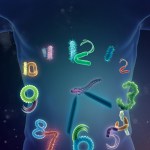circadian clocks
Ziv Zwighaft
Ziv Zwighaft is a research student in the group of the Weizmann Institute’s Dr. Gad Asher. Their new findings reveal some intriguing connections between our circadian clocks – which tick according to cycles of day and night – metabolism and aging. Here is his description:
King Solomon said: “There is a time for everything, and a season for every activity under the heavens.”
Our research tries to take this insight into the condition of living creatures a few strides forward. How strictly does it apply? Our lives are regulated by a biological clock – it’s actually many clocks…
To all bits of clockwork that are adjusted in our bodies according to our day-night timetable, we can now add two more: cancer growth and the schedules of our internal complements of bacteria.
Cancer, according to a new Weizmann Institute study, may grow and spread more at night. In this scenario, our cells are getting messages left and right, day and night, and taking them in through the specialized receptors on their outer membranes. During the daytime, our bodies produce natural “wake-up” hormones, and these apparently, take precedence over other incoming messages, their receptors…
The next time you reach into the fridge for a midnight snack – take heed: New research by Weizmann Institute scientists has shown that the time at which you eat your meals might have a profound effect on your liver triglyceride levels. Their research was conducted on mice, but if found to be true for humans as well, it may have clinical implications in the way patients could be treated for fatty liver and other metabolic diseases, which are characterized by abnormally elevated levels of lipids in blood and liver cells.
Our bodies are naturally cued to carry out various biological…


